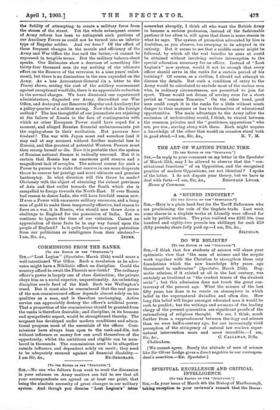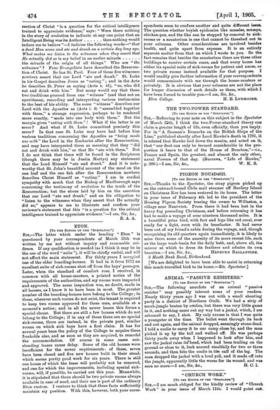SPIRITUAL EXCELLENCE AND CRITICAL INTELLIGENCE. [To THE EDITOR OP THE
"SPECTATOR.") SIR,—In your issue of March 4th the Bishop of Marlborough, taking exception to your reviewer's remark that the Recur-
rection of Christ "is a question for the critical intelligence trained to appreciate evidence," says: "Were there nothing in the story of evolution to indicate at any one point that an Intelligent Being was its Author then nothing would induce me to believe "—I italicise the following words—" that a dead Man arose and ate and drank on a certain day long ago What makes me listen to the witnesses when they assert that
He actually did so is my belief in an earlier miracle the miracle of the origin of all things." Who are "the witnesses" P Four Evangelists have described the Resurrec- tion of Christ. So has St. Paul. Four of these five witnesses nowhere assert that our Lord "ate and drank." St. Luke in his Gospel describes Jesus as "eating " ; and in the Acts he describes St. Peter as saying (Acts x. 41), "us, who did eat and drink with him." But many would say that these two traditions proceed from one " witness " (and that not an eyewitness), recording and interpreting various testimonies to the best of his ability. The same "witness" describes our Lord with the Apostles as (Acts i. 4) " assembled together with them," a strange expression, perhaps to be rendered more exactly, "made into one body with them." But the margin gives "eating with them" ! What if the latter is an error? And what if St. Luke committed precisely this error In that case St. Luke may have had before him various traditions concerning the Apostles as "being made one with" the Lord in the Eucharist after the Resurrection, and may have interpreted them as meaning that they "did eat and drink with him," or that He "ate with them." But I, do not think that there will be found in the Scriptures (though there may be in Justin Martyr) any statement that the Lord Himself "ate and drank." And it is note- worthy that St. John's beautiful account of the meal on the one loaf and the one fish after the Resurrection nowhere 'describes Christ Himself as "eating." I am in cordial sympathy with much that the Bishop of Marlborough says concerning the testimony of evolution to the truth of the Resurrection; but the stress laid by him on the assertion that our Lord "ate and drank," and on his obligation to "listen to the witnesses when they assert that He actually did so," appears to me to illustrate and confirm your reviewer's statement that this "is a question for the critical intelligence trained to appreciate evidence."—I am, Sir, &c.,
E. A. A.







































 Previous page
Previous page